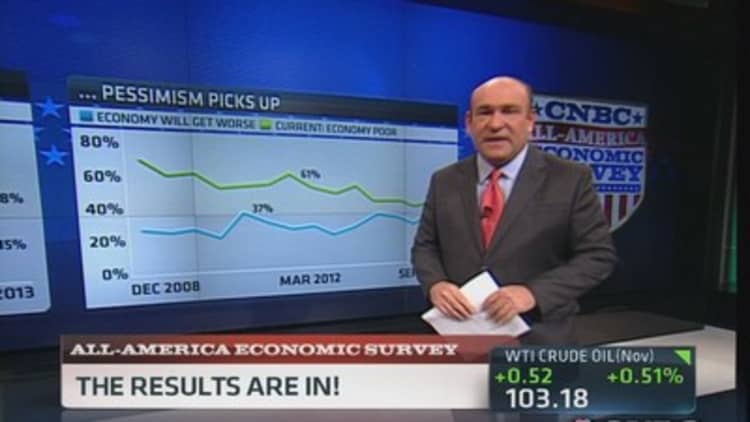On the eve of another potentially bruising political battle over the nation's debt, American sentiment dipped back into its post-crisis financial funk, according to the CNBC All-America Economic Survey.
The third quarter survey of 812 Americans across the country found 61 percent saying they are downbeat on the current state of the economy and pessimistic for the economic future, a 5-point increase from the prior quarter and the highest level in almost two years.
Smaller expected gains in Americans' paycheck and housing values cast a pall on sentiment in the quarter and reversed a brief blip of optimism measured three months ago. The survey found that middle class attitudes registered some of the biggest declines. The percentage of white collar workers who believe the economy will improve in the next year declined 18 points compared to the second quarter, three times the decline for all adults. Only one in three college grads expect their wages to rise in the next year, down from one in two in the last quarter.
There were two optimistic signs: Americans lowered their outlook for inflation over the next year, and nearly 52 percent of investors—those who report owning at least some stock—believe now is a good time to invest in equities, up 4 points from the last survey and equal to the highest level since the financial crisis hit in 2008.
But neither was enough to offset the prevailing negative sentiment. Americans said they expect their home values to rise just 0.8 percent on average in the next year, down from 3.1 percent in the second quarter. Although higher than in the depths of the recession, expectations for wage gains in the next year averaged 3.1 percent, down from 3.9 percent in the second quarter. More significantly, just 34 percent of respondents expect any increase at all in their paychecks, compared with 41 percent a quarter ago.
(Read more: 'No taper' shouldn't have been a surprise: New York Fed boss)

In a separate question, more American say their stock portfolios and their local housing markets are better than they were a year ago. But those are the only two areas to show net improvement. When it comes to comparing the current job market to last year, 29 percent say it's improved, 41 percent say it's worsened and 28 percent call it unchanged. More than half of respondents say America's standing in the world has deteriorated in the past year, and almost 40 percent say America's national security has worsened.
The survey, which has a margin error of plus or minus 3.4 percentage points, was conducted Monday through Thursday last week, just after the U.S. threatened military action over Syria's alleged use of chemical weapons and just as a dispute over funding the government became public. The downbeat attitudes of Americans registered in the survey suggests it would be a potentially poor time for Washington to engage in another down-to-the-wire negotiation over government funding and raising the debt ceiling. Economic pessimism was last this high in November 2012 just as the debt ceiling debate began to rage.
(Read more: Most Americans against defunding Obamacare: Survey)
On the issue of raising the debt ceiling, Americans have hardened their positions. CNBC asked respondents to choose which was worse: not raising the debt ceiling and the government defaulting on its obligations; or raising the debt ceiling and the U.S. going further into debt. Forty-nine percent were more concerned about the nation going further into debt, up 8 points from when the question was last asked in June. But 41 percent said they were more concerned about the government defaulting, up 9 points from June. When the question was first asked in June 2011, just 25 percent of the public was more concerned about default. Interestingly, in this poll, the percentage of American unsure about their views plunged to 6 percent from 22 percent.
Even though the annual federal budget deficit has improved in the past year, 66 percent of Americans believe it has worsened and only 8 percent say it's gotten better.
—By CNBC's Steve Liesman. Follow him on Twitter: @steveliesman.


